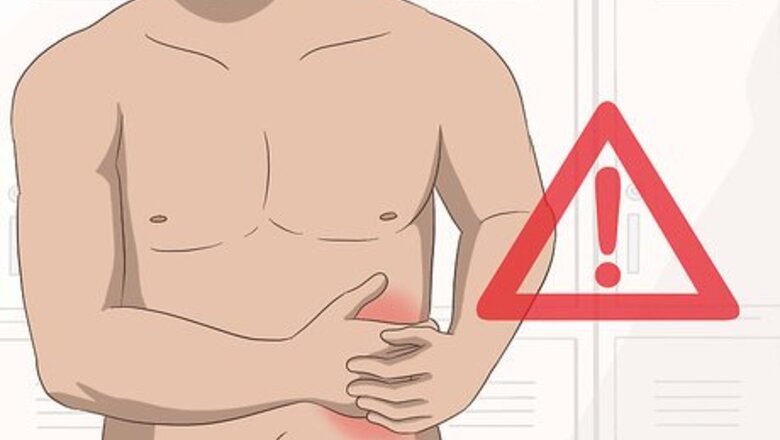
views
X
Trustworthy Source
Mayo Clinic
Educational website from one of the world's leading hospitals
Go to source
Although they're uncomfortable, most kidney stones are small enough to pass without medical treatment. Studies show that with water, pain medication, and your doctor's advice, you can pass a kidney stone without going to the hospital.[2]
X
Trustworthy Source
Mayo Clinic
Educational website from one of the world's leading hospitals
Go to source
To lower the risk of future kidney stones, you can limit your salt intake, eat a low-fat diet, and stick to any other dietary changes recommended by your doctor.
Passing Small Kidney Stones
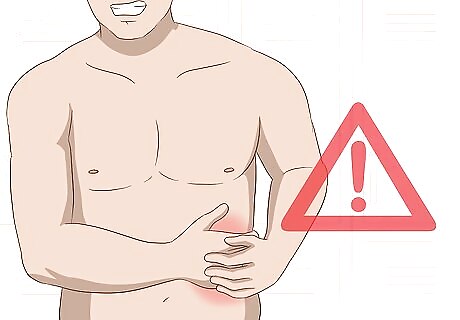
See your doctor if you suspect you have kidney stones. Symptoms of kidney stones include sharp pain in the sides, back, groin, or lower abdomen, as well as pain while urinating, cloudy urine, and the inability to urinate or blood in your urine. See your doctor for an accurate diagnosis and to come up with the proper treatment plan. Doctors diagnose kidney stones using blood and urine tests, ultrasounds, and x-rays. Tests and imaging scans can let them know what kind of stones you have, how large they are, and whether they're small enough to pass on their own.
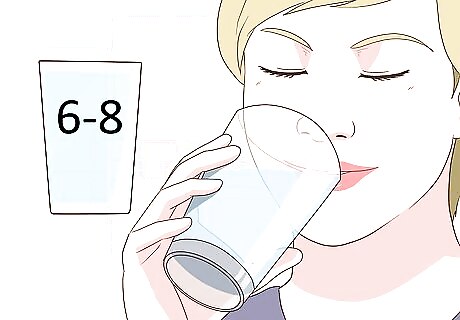
Drink at least 6 to 8 c (1.4 to 1.9 L) of water per day. Water flushes your kidneys and can help the stones pass. Check your urine to monitor your fluid intake. If your urine is pale yellow, you're drinking enough water. If it's dark, you're dehydrated. Staying hydrated can help prevent future stones from forming, so drinking plenty of water every day is essential. Water is best, but you can also drink ginger ale and some types of 100% fruit juice in moderation. Avoid drinking grapefruit juice and cranberry juice, which can increase the risk of kidney stones. Avoid caffeine or limit your consumption, as it can lead to dehydration. Try to drink no more than 1 c (240 mL) of caffeinated coffee, tea, or cola per day.
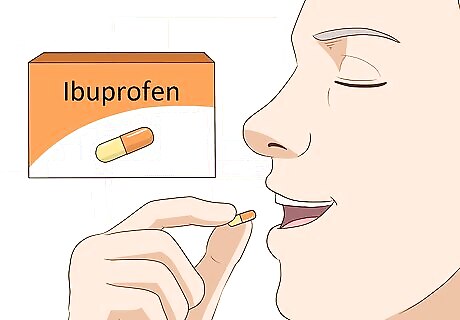
Take pain relievers as needed or as advised by a doctor. While most kidney stones go away without medical treatment, passing them is still a painful process. To manage pain, take an over-the-counter pain reliever, such as ibuprofen or aspirin. Check the label, and use your medication as directed. If over-the-counter pain relievers aren't effective, ask your doctor for a prescription medication. If necessary, they'll give you a prescription-strength pain reliever (such as ibuprofen) or, in some cases, prescribe a narcotic pain reliever. Be sure to take any prescription medication according to your doctor's instructions.
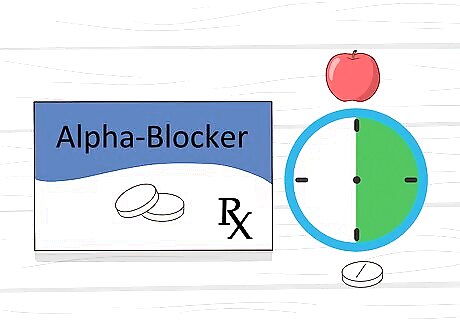
Ask your doctor if they recommend an alpha-blocker. Alpha-blockers relax muscles in the urinary tract and can make it easier to pass kidney stones. They're available by prescription and, typically, should be taken 30 minutes after a meal at the same time daily. Side effects may include dizziness, lightheadedness, weakness, diarrhea, and fainting. Getting out of bed or standing up slowly can help prevent lightheadedness and fainting. Tell your doctor if any side effects are persistent or severe.
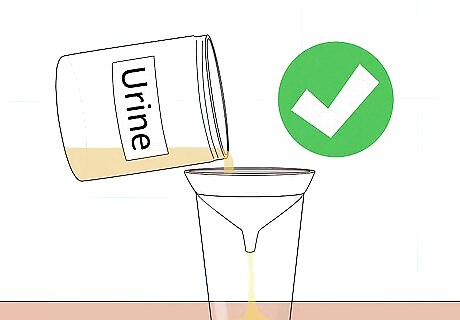
Attempt to collect a stone, if your doctor advises. To catch a stone, your doctor may ask you to urinate into a cup, then strain the sample. Collecting a stone is necessary if you've been diagnosed with a urinary blockage, or if the type or cause of your kidney stones is unknown. Long-term management of kidney stones varies depending on the type and cause. In order to come up with an effective treatment plan, your doctor might need to test a collected sample. If necessary, your doctor will provide you with the required equipment and instruct you how to collect and strain a sample.
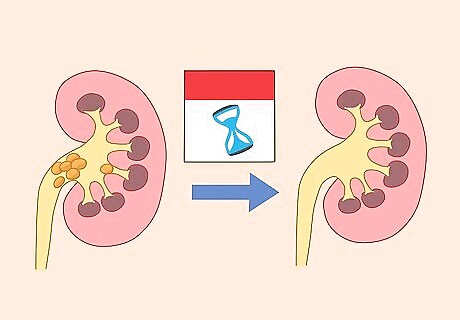
Allow at least a few weeks for kidney stones to pass. It can take anywhere from several days to a few months for small kidney stones to pass. During this time, continue to take any medications according to your doctor's instructions. Stay hydrated, do your best to manage pain, and follow the diet plan suggested by your doctor. Waiting for small kidney stones to pass can be frustrating, but try to be patient. Although they usually pass on their own, sometimes kidney stones require medical intervention. While waiting to pass the stones, check in with your doctor if you experience any worsening symptoms, such as severe pain, the inability to urinate, or blood in your urine.
Seeking Medical Treatment for Kidney Stones
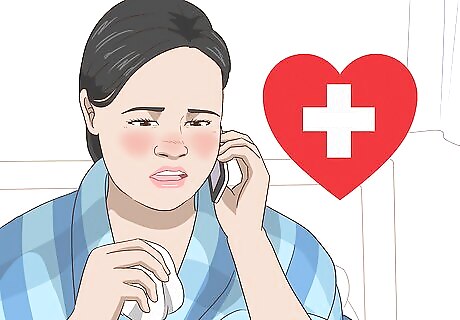
See a doctor promptly if you experience urgent symptoms. Serious symptoms include blood in your urine, fever or chills, changes in skin color, severe pain in your back or side, vomiting, or a burning sensation when you urinate. If you're waiting for a smaller stone to pass, call your doctor if you experience any of these symptoms. If you haven't seen a doctor or haven't been diagnosed with kidney stones, seek medical attention if you experience these symptoms. Doctors take ultrasounds or x-rays to find kidney stones. If they determine a stone is too large to pass on its own, they'll recommend a treatment method based on the stone's size and location.
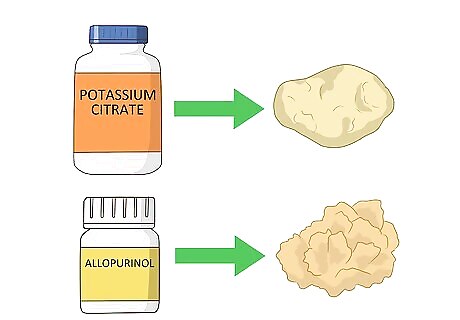
Take medication to stop stones from growing and forming. Your doctor might prescribe medications that help break down and remove the substance that's causing the stones. For instance, potassium citrate is used to manage calcium stones, which are the most common. For uric acid stones, the drug allopurinol helps lower levels of uric acid in the body. Side effects vary and may include upset stomach, diarrhea, nausea, and drowsiness. Let your doctor know if any side effects are persistent or severe.
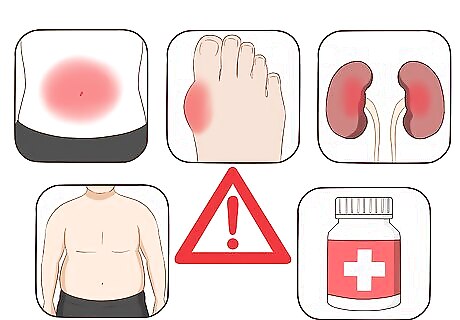
Talk to your doctor about treating an underlying cause, if necessary. Digestive disorders, gout, kidney disease, obesity, and some medications can contribute to kidney stones. In order to lower your risk of future stones, consult your doctor about treating an underlying condition, making dietary changes, or switching medications. For struvite stones, which are caused by infections, your doctor will likely prescribe an antibiotic. Take any medication as directed, and don't stop taking your medicine without consulting your doctor. Maintaining a healthy weight, monitoring blood pressure, maintaining a normal blood sugar level, and avoiding smoking are effective ways to maintain healthy kidneys.
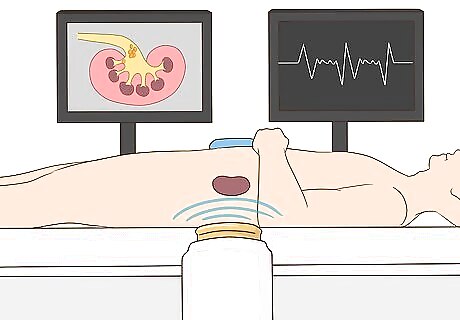
Break up larger stones with shock wave therapy. Lithotripsy, or shock wave therapy, is used to treat most large kidney stones that are located in the kidneys or upper urinary tract. A machine sends high-pressure sound waves through the body, which break large stones into smaller pieces. These pieces can then be passed when you go to the bathroom. You'll be given medication to help you relax or fall asleep during the procedure. It takes about an hour, and you'll spend about 2 hours in recovery. Most people go home on the same day as the procedure. Rest for 1 to 2 days before resuming your normal activities. Pieces of the stone may take 4 to 8 weeks to pass. During that time, you may have pain in your back or side, experience nausea, or see small amounts of blood in your urine.
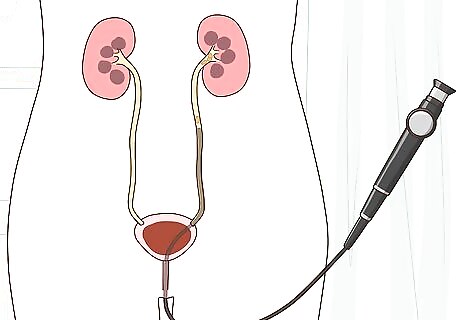
Undergo a cystoscopy for large stones in the lower urinary tract. The lower urinary tract includes the bladder and urethra, or the tube where urine leaves the body. A special thin device is used to find and remove larger stones in these areas. Your doctor may also recommend a similar procedure called a ureteroscopy to remove stones in the tubes that connect the kidneys to the bladder. If a stone is too large to be removed, a laser breaks it into pieces small enough to pass when you go to the bathroom. Cystoscopies and ureteroscopies are often performed under general anesthesia, which means you'll be asleep during the procedure. Most people are able to go home the same day as the procedure. For the first 24 hours after the procedure, you might experience a burning sensation when you urinate and see small amounts of blood in your urine. Let your doctor know if these symptoms last more than a day.
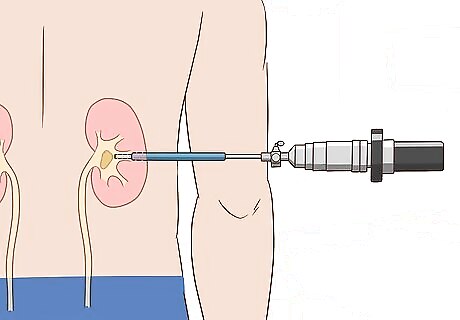
Ask your doctor about surgery if other methods aren't effective. Kidney stones rarely require surgery, but it might be necessary if other options are unavailable or ineffective. A tube is inserted into the kidney through a small incision in the back. The stones are then either removed or broken up with a laser. Some people spend at least 2 to 3 days in the hospital after a nephrolithotomy, which is the technical name for the surgical procedure. Your doctor will provide instructions about changing the dressing, caring for the incision site, and resting after the procedure.
Preventing Kidney Stones
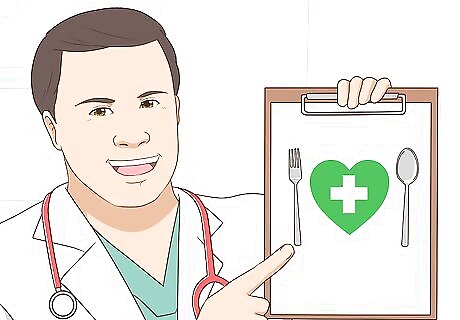
Discuss how to prevent specific types of stone with your doctor. Your doctor will recommend dietary changes for the specific type of stones you have. Adjustments such as limiting sodium, eating a low-fat diet, and staying hydrated apply for all types, but certain foods contribute to specific types of kidney stones. For example, if you have uric acid stones, you'll need to avoid herring, sardines, anchovies, organ meats (such as liver), mushrooms, asparagus, and spinach. If you have calcium stones, you'll need to avoid calcium and vitamin D supplements, limit your intake of calcium-rich foods to 2 to 3 daily servings, and avoid antacids that contain calcium. Note that people who have kidney stones once are at an increased risk of having them in the future. Kidney stones recur within 5 to 10 years in about 50% of people who have them once. Preventative measures, however, may lower your risk of recurrence.
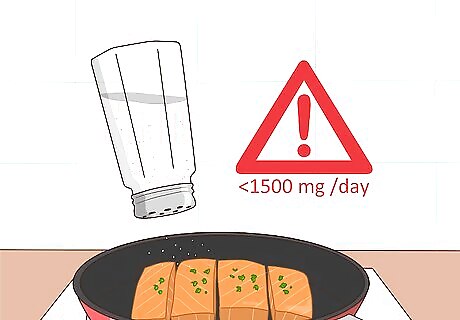
Try to consume less than 1500 mg of salt per day. While 2300 mg of sodium is the maximum daily amount recommended for adults, your doctor will probably suggest sticking to 1500 mg per day. Avoid adding extra salt to your food, and try to limit the amount of salt you use to cook. Instead of cooking with salt, flavor your meals with fresh and dried herbs, citrus juice, and zest. Try to cook your own food as much as possible instead of going to restaurants. When you eat out, you can't control the amount of salt in your meals. Avoid deli and processed meats, as well as meats that have been pre-marinated. Additionally, steer clear of salty snacks, such as chips, and canned foods, such as soups. Check the sodium content on any packaged foods before you eat them.
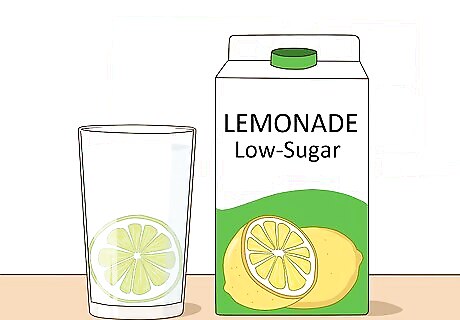
Add lemon to your diet, especially if you have calcium stones. Squeeze a lemon into your water or have a daily glass of low-sugar lemonade. Lemon can help break down calcium stones and might prevent them from forming. Lemon may also help lower the risk of uric acid stones. Try not to drink lemonade or other lemon products that are high in sugar.
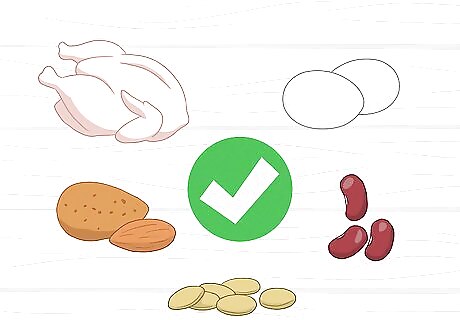
Eat moderate amounts of lean proteins. You'll likely be able to eat animal products in moderation, provided they're low-fat, such as white meat poultry and eggs. To lower the risk of kidney stones of any type, avoid fatty cuts of red meat, and do your best to get as much protein as you can from plant-based sources, such as beans, lentils, and nuts. If you're prone to uric acid stones, try not to eat more than 3 oz (85 g) of meat per meal. To manage uric acid stones, note that your doctor might suggest cutting out animal protein altogether, including eggs and poultry.
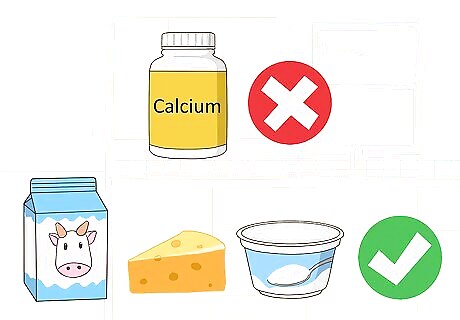
Include calcium-rich foods in your diet, but skip the supplements. Some people with calcium stones think they should avoid calcium altogether. You still need to consume calcium to keep your bones healthy, so go for 2 to 3 daily servings of milk, cheese, or yogurt. Don't take calcium, vitamin D, or vitamin C supplements, and steer clear of antacids that contain calcium.
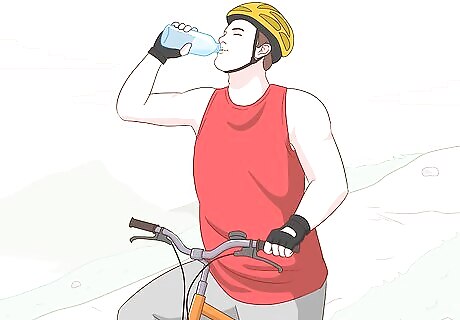
Exercise regularly, but drink extra water to stay hydrated. Try to get about 30 minutes of exercise per day. Regular physical activity is important for your overall health. Brisk walks and bike rides are great forms of exercise, especially if you're not used to being active. While exercise is important, pay attention to how much you sweat. The more you sweat, the more water you'll need to drink. To avoid dehydration, aim to drink about 1 c (240 mL) of water every 20 minutes during intense exercise, hot weather, or whenever you're sweating a lot.




















Comments
0 comment